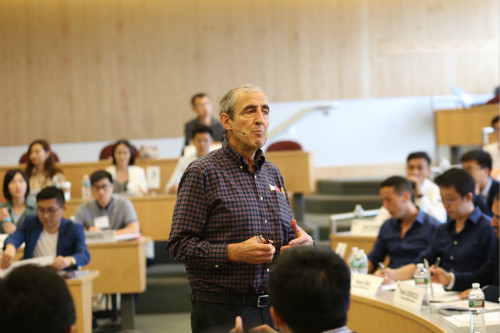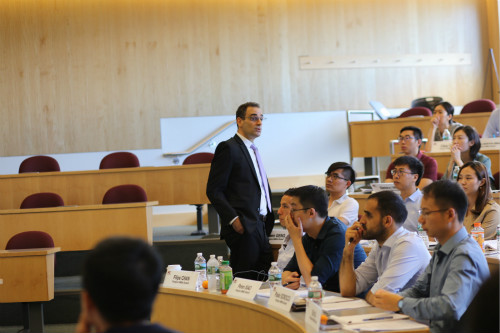Text by Bruno CHAN, GMBA Class of 2018; Photo by Lei LI, PMBA Class of 2019
It was a beautiful summer in Boston this year. My last visit to the city was almost 10 years ago, and this time I had the opportunity to really appreciate it all. On Sunday, June 18, my fellow classmates and I were all checked in to McGregor house, a dorm on the west side of the MIT campus, right by Charles River. All 42 Tsinghua GMBA class of 2018 students and 7 Tsinghua PMBA students were as excited as me for the next day when our first class would kick off with senior lecturer John Akula. After months of meticulous preparation and incredible devotion by our MBA office, the stage was set for an incredible week. Accompanied by Doris XUN and Rikki ZHAO from MBA office, and Tsinghua SEM Associate Dean and Professor Xiaojun QIAN, it was only a matter of hours until we were finally inside the MIT Sloan School building, learning from the top scholars in their fields.

Group Photo at Maclaurin Building and Great Dome
On the first day, John Akula kicked off the course with a lesson on M&A and the difficulties and complications that arise in these negotiations. In both cases studied, IBP vs. Tyson and Hexion vs. Huntsman, students had the opportunity to learn how contracts between targets and acquirers are made and how the process of M&A is conducted. To my surprise, after a contract is signed between both parties, it isn’t until a few months later that the deal is actually closed. During this period of few months, target companies usually suffer drawback and lose productivity, sales, and even work force since employee’s futures become uncertain. To protect targets against acquisition forfeit, M&A contracts have clauses that disallow acquirers to jump ship after signing and before closing. The cases of IBP vs. Tyson and Hexion vs. Huntsman are iconic examples of acquirers trying to forfeit a deal after signing. Here, we had the opportunity to learn more about the judiciary system of the United States, particularly how judges have to use their own discretion and judgment to resolve complicated cases like these.

Professor John Akula is lecturing for the first day
Professor Deborah Ancona took over day 2 with How Do You Develop as a Leader, challenging us to think about what kind of leaders we are and what kind of leaders we are not. In this class, Deborah showed us how there are essentially four different kinds of traits that leaders have; sense-making, relating, visioning, and inventing. Her main argument was that there is no such thing as a complete leader that masters all four skillsets. One should recognize his/her deficiencies and surround themselves with others that complement them. For instance, if you are a visionary and an inventor, try to find people that can complement your lack of relating and sense-making. During an in-class exercise, Deborah asked us to pick figure cards that best describe our leadership skills, giving us the opportunity to share with the class what kind of leaders we think we are. This lecture was incredibly enlightening for many of us since we were forced to self-criticize, painting the path of what kind of people we should work with in the future.

Professor Deborah Ancona is having How Do You Develop as a Leader for the second day
Jake Cohen, an INSEAD senior lecturer, guided us through day 3 with a merger case between Southcorp and Rosemount. Southcorp liquidated two of its businesses and focused on the wine industry. In an attempt to become a world leader in the wine industry, they acquired Rosemount Estate, a famous and exclusive Australian winery. During the first part of the course, Jake reviewed some of the basic tools used in company valuation, breaking it down into cash flows, growth, and risk. After the basics were in check, Jake dug deeper into the merger by exploring the challenges and outcomes of the deal. Rosemount’s CEO Keith Lambert was assigned the combined company’s leadership. Although he excelled at his previous position leading a national wine company, he was not prepared to take on his new responsibilities of a global enterprise. In a short period of time, Lambert’s failed strategy dragged the company to bankruptcy and Southcorp was forced to sell to Foster’s at an incredibly cheap price. The main lesson I learned from this lecture is that what works today does not necessarily work tomorrow. Coincidentally, at the same time we discussed this case, Travis Kalanick, Uber’s CEO, had just resigned for similar reasons that Keith Lambert dragged Southcorp down. Both CEO’s excelled at an earlier stage of their companies, but were not prepared to lead a global enterprise.

Professor Jake Cohen is taking over day 4
On the last day of lectures, Professor Nelson Repenning introduced us to Systems Thinking and Systematic Management. Here, Nelson had the opportunity to teach us the importance of communication and systematic thinking during organizational change. According to his studies, humans have a natural instinct to blame people instead of systems which, is detrimental to companies in the long run. Through various in-class examples, Nelson was able to demonstrate how inefficient companies incorrectly fire good managers because of short term results. The lecture finished with the topic of ‘capability trap’, where well intentioned managers inadvertently undermine capability building needed for success in search for higher revenues and faster growth.

Professor Nelson Repenning is introducing Systems Thinking and Systematic Management in day 4
My MIT experience was great. My appreciation goes to the MIT staff for actively participating in class and giving us the opportunity to experience the MIT campus life. And the Tsinghua GMBA office deserves a standing ovation for their hard work and months of preparation. It was because of them that this course was executed successfully and we thank them once again for their hard work and dedication.